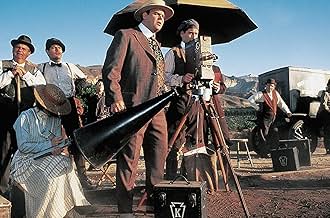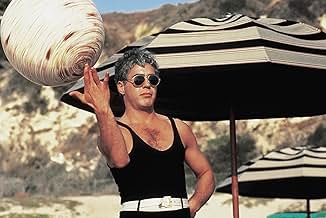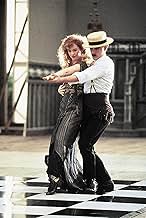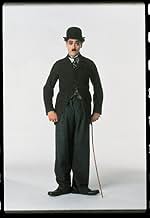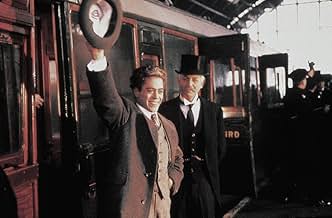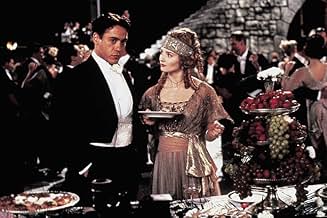ÉVALUATION IMDb
7,5/10
63 k
MA NOTE
Un film sur la vie troublée et controversée du maître cinéaste Charles Chaplin.Un film sur la vie troublée et controversée du maître cinéaste Charles Chaplin.Un film sur la vie troublée et controversée du maître cinéaste Charles Chaplin.
- Nommé pour 3 oscars
- 3 victoires et 20 nominations au total
Deborah Moore
- Lita Grey
- (as Deborah Maria Moore)
Histoire
Le saviez-vous
- AnecdotesGeraldine Chaplin played her real-life paternal grandmother Hannah Chaplin.
- GaffesWhen Charlie is shown at the 1972 Oscars near the end of the movie, he is showed being brought to the podium in the wheelchair and then standing at the podium as the movie clips played. In the actual awards ceremony, Charlie walked out to the podium under his own power after the clips ended.
- Citations
German Diplomat: [offering his hand] Mr. Chaplin! I am a great admirer of yours.
Charlie Chaplin: I'm sorry, I prefer not to shake hands with Nazis.
German Diplomat: [laughs nervously] What have you got against us, Mr. Chaplin, hm?
Charlie Chaplin: What have you got against everybody else?
- Générique farfeluThe film ends with the final scene of Le cirque (1928): Charlie Chaplin walks off into the distance.
- Autres versionsTo receive a 12 certificate the original UK cinema version was cut to remove one use of 'fucking' (during Charlie's homecoming visit to a pub). Later releases were uncut and upgraded to a 15 rating.
- ConnexionsFeatured in Friday Night: Episode #1.11 (1992)
- Bandes originalesThe Honeysuckle and The Bee
Written by Albert Fitz and William H. Penn (as William Penn)
Commentaire en vedette
The first thing one should know about "Chaplin" is that, paradoxically, very little of it has to do with Chaplin. Or, at least, it has more to do with the writers' illusions of him. The film claims to be based on "My Autobiography" and on "Chaplin: His Life and Art", by David Robinson. Having re-read the Autobiography before watching the film, it is clear to me that what the writers did was take basic incidents from the autobiography and embellish them with, I can only assume, parts of the Robinson book. What results is a series of scenes which were vaguely influenced by the facts, but so simplified and primitive that little of the original truth remains.
What the writers did not wish to acknowledge was that when Chaplin wrote vaguely or skimmed past certain parts of his life, he really didn't want anyone to delve into them - and the filmmakers did just that. "Chaplin" is not really about Charlie Chaplin, his work and films. It is simply ceaseless speculation on his personal life, but going on even more vaguely about it than the Autobiography.
I am well aware that almost every biopic focuses more on the personal life of a person than on their work. The problem is that most of the characters in "Chaplin" are so exaggerated and simplified that they become almost completely unbelievable - both as the real people AND as fictional characters. None of them are fully developed. This is not entirely the fault of the supporting cast (although it really is not that interesting): the fault lies with the screenplay, which is too often bland and melodramatic. This is especially obvious in the ridiculous subplot concerning the older Chaplin and his editor, which is the most pointless and badly done part of the film; even Hopkins cannot make the lines sound credible, which is all the proof anyone needs of their mediocrity. The film would have worked immeasurably better without these additions.
Many of the most interesting aspects and parts of Chaplin's life are completely ignored, oddly, with seemingly irrelevant or less important stories added in for little reason. One scene in particular is added only to insert a Chaplin-esquire physical comedy sequence which falls flat. The writers greatly accentuated everything to do with Hetty Kelly, even making the same actress play Oona O'Neill; the tried too hard to give him some kind of motive for his relationships, which only leads to more bias and speculation; and although I am by no means a Chaplin purist or even a very knowledgeable admirer, the blatant alterations on the actual history grated on my nerves.
All this being said, the film is certainly not a terrible one. Mainly, however, this is for one reason only, and that is - yes - Robert Downey Jr. himself. The praise he received for the role is by no means undeserved. As Chaplin he is perfect, managing to make the best out of his rather predictable lines, remaining interesting, believable, and in many parts moving. He has wonderful timing and intensity, and even looks the part (he could even do the roll dance). I really quite believed he was Chaplin. Even his performance, however, suffers greatly because of the lines - and the flash-forwards. I have no doubt that he could have played an even better Charlie Chaplin in a differently made film.
The greatest scene in "Chaplin", I think, is the opening credits: Charlie arrives in his dressing room, alone, sits, and begins to remove his make-up. The scene is in black and white, and there is no dialogue - only music. Every emotion is expressed simply through his eyes. If the rest of the film had been made like this, I actually think it could have been perfect. Either way, the lead performance is astounding, the music is beautiful, and though not very insightful or too true to history, this film is well worth watching.
What the writers did not wish to acknowledge was that when Chaplin wrote vaguely or skimmed past certain parts of his life, he really didn't want anyone to delve into them - and the filmmakers did just that. "Chaplin" is not really about Charlie Chaplin, his work and films. It is simply ceaseless speculation on his personal life, but going on even more vaguely about it than the Autobiography.
I am well aware that almost every biopic focuses more on the personal life of a person than on their work. The problem is that most of the characters in "Chaplin" are so exaggerated and simplified that they become almost completely unbelievable - both as the real people AND as fictional characters. None of them are fully developed. This is not entirely the fault of the supporting cast (although it really is not that interesting): the fault lies with the screenplay, which is too often bland and melodramatic. This is especially obvious in the ridiculous subplot concerning the older Chaplin and his editor, which is the most pointless and badly done part of the film; even Hopkins cannot make the lines sound credible, which is all the proof anyone needs of their mediocrity. The film would have worked immeasurably better without these additions.
Many of the most interesting aspects and parts of Chaplin's life are completely ignored, oddly, with seemingly irrelevant or less important stories added in for little reason. One scene in particular is added only to insert a Chaplin-esquire physical comedy sequence which falls flat. The writers greatly accentuated everything to do with Hetty Kelly, even making the same actress play Oona O'Neill; the tried too hard to give him some kind of motive for his relationships, which only leads to more bias and speculation; and although I am by no means a Chaplin purist or even a very knowledgeable admirer, the blatant alterations on the actual history grated on my nerves.
All this being said, the film is certainly not a terrible one. Mainly, however, this is for one reason only, and that is - yes - Robert Downey Jr. himself. The praise he received for the role is by no means undeserved. As Chaplin he is perfect, managing to make the best out of his rather predictable lines, remaining interesting, believable, and in many parts moving. He has wonderful timing and intensity, and even looks the part (he could even do the roll dance). I really quite believed he was Chaplin. Even his performance, however, suffers greatly because of the lines - and the flash-forwards. I have no doubt that he could have played an even better Charlie Chaplin in a differently made film.
The greatest scene in "Chaplin", I think, is the opening credits: Charlie arrives in his dressing room, alone, sits, and begins to remove his make-up. The scene is in black and white, and there is no dialogue - only music. Every emotion is expressed simply through his eyes. If the rest of the film had been made like this, I actually think it could have been perfect. Either way, the lead performance is astounding, the music is beautiful, and though not very insightful or too true to history, this film is well worth watching.
- prettymaryk
- 19 mai 2008
- Lien permanent
Meilleurs choix
Connectez-vous pour évaluer et surveiller les recommandations personnalisées
- How long is Chaplin?Propulsé par Alexa
Détails
- Date de sortie
- Pays d’origine
- Sites officiels
- Langues
- Aussi connu sous le nom de
- Charlie
- Lieux de tournage
- sociétés de production
- Consultez plus de crédits d'entreprise sur IMDbPro
Box-office
- Budget
- 31 000 000 $ US (estimation)
- Brut – États-Unis et Canada
- 9 493 259 $ US
- Fin de semaine d'ouverture – États-Unis et Canada
- 84 669 $ US
- 27 déc. 1992
- Brut – à l'échelle mondiale
- 9 493 259 $ US
- Durée2 heures 23 minutes
- Couleur
- Rapport de forme
- 1.85 : 1
Contribuer à cette page
Suggérer une modification ou ajouter du contenu manquant




